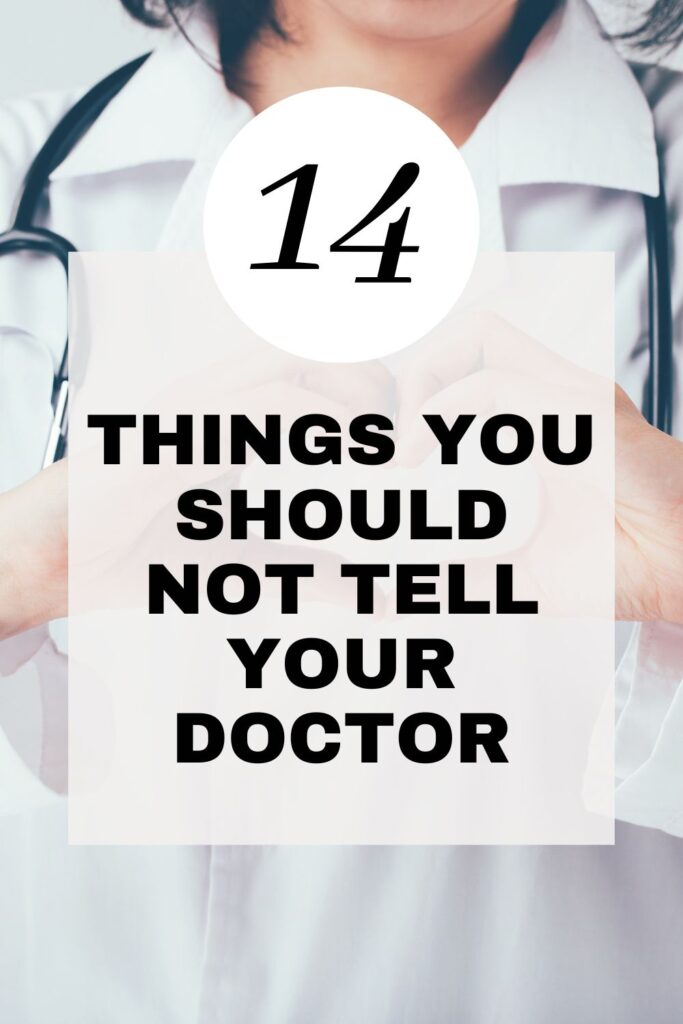Introduction: The Importance of Transparency in Healthcare
Let’s break down the things you should not tell your doctor—and why, in reality, you should be completely honest instead. When visiting your doctor, opening up about personal health issues can sometimes feel scary. However, transparency is key to getting the right care. You might think that hiding certain details, such as your habits or minor traits, won’t make a difference. But the truth is that every piece of information can affect the way your doctor understands your health.

Why Honesty Matters in Healthcare
Building Trust with Your Doctor
A strong doctor-patient relationship is built on trust. Your doctor is not there to diagnose you, but to help you. The more honest you are, the better they can diagnose and treat you. By withholding information, you risk not only a misdiagnosis but also a treatment plan that may not be right for you.
The Impact of Dishonesty on Treatment Outcomes
When you don’t talk openly with your doctor, it can lead to complications. Intentionally or unintentionally misleading your healthcare provider may result in incorrect treatment or dosage. It’s not just about hiding the big details – sometimes it’s the little things that matter, like whether you’re taking herbal supplements or experiencing side effects from a medication.
1. Common Misconceptions Patients Have
Misbeliefs About Self-Diagnosis
One of the most common misconceptions is the idea that you can judge yourself based on what you read online. It’s okay to Google your symptoms and tell your doctor what you think is wrong, but your doctor is trained to provide an accurate diagnosis. Always give them the whole picture rather than narrowing it down to what the problem is.Always give them the whole picture rather than narrowing it down to what the problem is, and avoid withholding important information or believing in ‘things you should not tell your doctor,’ as full honesty is crucial for proper care.

Thinking Your Doctor Will Judge You
Many people fear that their doctors will judge them based on their lifestyle choices or health conditions. Doctors have seen it all. They are not there to pass judgment but to help you achieve the best health outcomes.
Fearing the Disclosure of Personal Habits
Sometimes patients are reluctant to disclose personal habits such as smoking, drinking or drug use for fear of legal consequences or embarrassment. However, these factors are important for your doctor to know, as they affect your overall health and the treatment you receive.
2. Myths Around Doctor-Patient Confidentiality
Clarifying Doctor-Patient Privilege
It is important to understand that doctors are bound by confidentiality laws. They are required by law to keep your information private unless your health is in immediate danger or you are a danger to others. Understanding this can help ease the fear of being honest with them.
Legal and Ethical Guidelines Doctors Follow
Doctors follow strict ethical guidelines regarding patient information. This means they cannot share your health details without your permission unless it is for your safety. This privacy is for your protection, so don’t hesitate to speak up.
3. Things You Might Be Tempted to Hide but Shouldn’t
Past Medical History
Your past medical history is important for your doctor to understand your current health. Even if it’s unrelated to your current problems, past illnesses, surgeries or treatments can provide important context for new symptoms.
Mental Health Issues
Mental health is just as important as physical health, yet many people don’t feel comfortable discussing issues like anxiety, depression or stress with their doctor. This can be dangerous, as mental health often directly affects physical health. If you’re struggling, your doctor needs to know.
Medication Use
Whether you’re taking prescription drugs, over-the-counter medications, or herbal supplements, your doctor needs to know about them all. Some combinations may be dangerous, so full disclosure is important. There are no ‘things you should not tell your doctor’; withholding information could lead to incorrect diagnoses or harmful drug interactions.

4. Your Family Medical History
Why It’s Essential for Diagnosis
Your family’s medical history can tell you a lot about your own health risks. Many conditions are hereditary, so understanding your family’s health background can help your doctor make more informed decisions.
Genetic Conditions That Might Affect Your Health
Some genetic conditions, such as heart disease, diabetes or cancer, can run in families. Even if you feel perfectly healthy right now, this information is important for preventive care and early intervention.
5. Details About Your Habits
Drinking and Smoking Habits
You may be interested in reducing how much you drink or smoke, but your doctor may need to assess your risk for conditions such as heart disease, liver problems, or lung cancer. Things you should not tell your doctor can lead to inaccurate diagnoses or missed health risks. It’s better to be upfront, even if it doesn’t feel comfortable.

Recreational Drug Use
Recreational drug use is often a sensitive topic for patients. However, it is important information for your doctor to know, especially if you are being prescribed a medication that can react dangerously with certain substances.
Sexual Health and Activity
Sexual health is an important aspect of overall health, but many patients are reluctant to discuss it. However, whether it’s about birth control, sexually transmitted infections (STIs), or other sexual health concerns, your doctor needs to be aware.
6. Diet and Exercise Truths
Being Honest About Your Lifestyle
It’s easy to tell your doctor you’re eating well and exercising regularly, but if that’s not entirely true, your doctor’s recommendations may be wrong. Being honest about your lifestyle will help them give you more practical and achievable advice.
The Impact of False Information on Health Advice
If you exaggerate how healthy your lifestyle is, your doctor may not catch things early or give you advice that won’t work. Honesty leads to the best treatment plans based on your true habits.
7. Exaggerating Symptoms or Pain
Why Honesty About Your Symptoms Is Crucial
It makes sense for your doctor to take your symptoms seriously, but exaggerating pain or discomfort can lead to unnecessary testing or a misdiagnosis. Accurately describing what you’re experiencing is key to finding the right treatment. Things You Should Not Tell Your Doctor: Avoid overstating your symptoms or providing misleading information, as this can hinder proper diagnosis and delay effective care.”
How It Can Affect Diagnostic Accuracy
When you exaggerate symptoms, your doctor may focus on the wrong health problems. This can delay a proper diagnosis and possibly worsen your condition.
8. Underreporting Symptoms Out of Fear
Common Fears Patients Have
Many patients downplay symptoms because they fear further diagnosis or treatment. However, masking symptoms can lead to more serious problems in the future, as early diagnosis is often the key to effective treatment.
The Risks of Underreporting Pain or Discomfort
Pain and discomfort are signals from your body that something is not right. If you ignore these symptoms, you are denying your doctor the opportunity to catch potentially serious health problems early.
9. Embarrassing Questions You Should Still Ask
Why No Question Is “Too Embarrassing” for Your Doctor
If you’re experiencing something that feels embarrassing, such as unexpected physical changes or sexual health concerns, it’s still important to ask your doctor. Remember, they’ve seen it all, and nothing is too weird for them to handle. While there are Things You Should Not Tell Your Doctor if they are unrelated to your health or could mislead your treatment, sharing genuine concerns, no matter how uncomfortable, is vital for your well-being.
Addressing Bodily Changes or Sexual Health Concerns
Changes in your body, especially changes related to sexual health, can sometimes be indicators of larger health problems. Talking openly with your doctor about these changes is important for early detection and appropriate treatment.
10. Medical Conditions You Shouldn’t Hide
Chronic Illnesses
Even if you’re managing a chronic disease well, your doctor still needs to know about it. Diabetes, high blood pressure, or autoimmune diseases can affect how your body responds to other treatments.
Sexually Transmitted Infections (STIs)
STIs can be a difficult topic to discuss, but your doctor needs to know if you have or suspect an infection. This information is important for your health and preventing the spread of infection. Avoid withholding any relevant details, as leaving out crucial information could negatively affect your diagnosis and treatment. Remember, there are no “things you should not tell your doctor” when it comes to your health—honesty is key to getting the right care and ensuring your well-being.
Mental Health Struggles
Mental health problems such as anxiety, depression, or trauma are not always visible, but they play a huge role in your overall health. Talk openly with your doctor so they can help you manage both your mental and physical health.

11. Allergies and Medication Reactions
Why Allergies Matter in Prescriptions
Allergies, even minor allergies, can have serious implications when it comes to prescribing medication. Always notify your doctor of any known allergies, including food or environmental triggers.Things you should not tell your doctor include withholding or downplaying your symptoms, as it can lead to improper diagnosis or treatment. It’s important to be completely transparent with your healthcare provider.
Over-the-Counter Medicines That Could Interact with Prescribed Drugs
It’s common to think that over-the-counter medications are harmless, but they can interact with prescribed medications in unexpected ways. Share all medications or supplements with your doctor to avoid harmful interactions.

12. What Happens When You’re Not Honest With Your Doctor
Misdiagnosis and Treatment Failure
Withholding information from your doctor increases the risk of misdiagnosis or ineffective treatment. Even small things can make a big difference in how your doctor perceives your situation.
Potential Dangers of Withholding Key Information
When important information is withheld from your doctor, you may be exposed to unnecessary risks. This can include taking the wrong medication, getting unnecessary tests, or ignoring a serious health condition. However, there are also things you should not tell your doctor, such as false or misleading information, as it can distort their understanding of your health and lead to incorrect decisions regarding your care. It’s essential to be honest and clear, while avoiding any details that might complicate your diagnosis or treatment.
13. The Consequences of Hiding Information
Legal and Health Risks
In some cases, withholding information from your doctor can have legal ramifications, especially when it comes to prescription drugs. More importantly, it can have long-term effects on your health, as untreated Conditions can worsen over time.
The Potential for Worsened Outcomes
The more transparent you are with your doctor, the better they will be able to help you. Hiding important details or lying about your health can lead to worse outcomes, longer illness, or more serious medical problems in the future.
14. How to Approach Sensitive Topics with Your Doctor
Tips for Building Confidence in Sharing Sensitive Issues
Feeling nervous about sharing personal health information? It helps to remember that your doctor has heard it all before. Take a deep breath and know that they are there to help, not to criticize. If you’re still not sure, try starting the conversation with something simple and gradually move on to more sensitive topics. However, be cautious about discussing things that are unrelated to your health, as “Things You Should Not Tell Your Doctor” may include matters that don’t affect your treatment or diagnosis. Stick to relevant health concerns to ensure productive communication.
The Role of Empathy and Understanding in the Doctor-Patient Relationship
Doctors are trained to approach patients with compassion and understanding. Their role is to guide you to better health, and this can only happen when you work together as a team.
12 Things You Should Quit for a Better Life
Conclusion: The Importance of Full Transparency in Healthcare
In healthcare, honesty really is the best policy. Your doctor relies on the information you provide to make informed decisions about your care. By being open and transparent even about things that may seem uncomfortable or embarrassing, you’re helping to ensure that you get the best possible treatment. However, there are a few exceptions, such as things you should not tell your doctor, which may lead to misunderstandings or incorrect conclusions. Instead, focus on clear, relevant details about your health to avoid confusion and improve your medical care.
FAQs
- Can I be completely honest with my doctor without judgment?
Yes, doctors are trained to listen and provide care without judgment. Their priority is your health, not your personal choices.
- What if I am embarrassed to talk about certain health issues?
It’s normal to feel embarrassed, but remember that doctors have heard it all before. No concern is too small or too embarrassing to discuss.
- Will my doctor tell anyone if I share personal or illegal habits?
No, doctor-patient confidentiality ensures that your information remains private unless you pose a risk to yourself or others.
- How can I make sure my doctor understands my symptoms?
Be as specific and honest as possible when describing your symptoms. The more information you provide, the better your doctor can help.
- Why is it important to discuss mental health with my doctor?
Mental health is interconnected with physical health. Discussing mental health ensures you receive holistic care that addresses all aspects of your well-being.